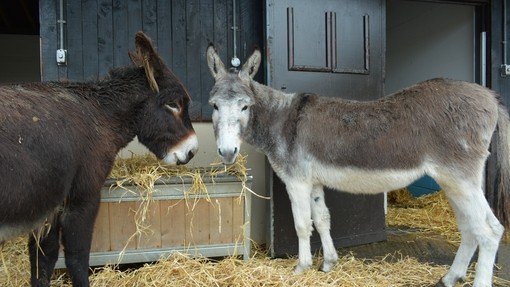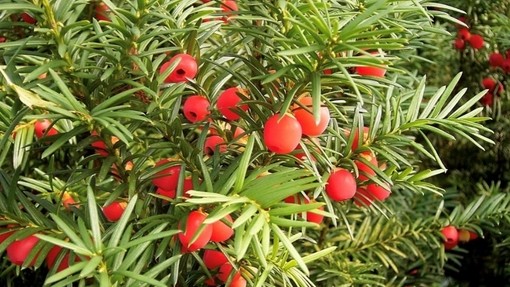How should I feed my donkey?
- Give your donkey free access to good-quality feeding straw (barley and wheat are best), with small quantities of hay, haylage, or grazing.
- Feed a vitamin and mineral supplement or a low energy forage balancer that does not promote weight gain.
- Make sure your donkey always has access to fresh clean water.
- Have your donkey’s teeth checked at least once a year by a qualified equine dental technician or vet. If your donkey has dental problems, replace long fibres (such as straw, haylage, and hay) with a shortchop diet instead. See factsheet: Feeding donkeys with dental problems for more information.
- Body condition score your donkey regularly. Donkeys are prone to weight gain, which can predispose them to laminitis and hyperlipaemia. See factsheets: Monitoring your donkeys weight, Laminitis in donkeys, and Hyperlipaemia in donkeys for more information.
- Feed according to your donkey’s body condition. Restrict intake of energy-rich feeds (such as hay, haylage, or grass) if your donkey is overweight. Make sure a source of fibre (such as straw) is always available to satisfy your donkey’s need to trickle feed. See factsheet: Feeding and managing the overweight donkey for more information.
- Carefully restrict your donkey’s grazing by limiting the amount of grass that is available.
- Make sure any supplementary feeds are high in fibre, low in calories, and suitable for laminitics. See factsheet Feeding donkeys with laminitis.
Always introduce changes to your donkey’s diet gradually. Check to make sure they are eating.
What should I avoid?
- Avoid cereal grain-based feeds. You can maintain your donkey, and even encourage weight gain, on fibre based products. See our factsheet on Feeding and managing an underweight donkey for more information.
- Do not feed sugary treats. Use natural treats for training or handling purposes. Feed no more than a handful of chopped apples, carrots, or high-fibre nuts each day. See factsheet: Safe treats for donkeys.
- Do not feed unnecessary supplements. Unless your vet tells you otherwise, your donkey should only need a vitamin and mineral supplement or forage balancer. Additional supplements may put your donkey off their feed, or cause health problems due to an overdose of nutrients.
- Do not provide sugar-based licks. These are often marketed as ‘boredom breakers’ but are not suitable for donkeys due to their high sugar content.
- Do not give straw with retained grain to your donkey, either as feed or bedding.
- Do not restrict your donkey’s total food intake to encourage weight loss. If your donkey needs to lose weight, feed low-calorie products in combination with exercise. Extreme dieting can put donkeys at risk of developing hyperlipaemia, a potentially fatal condition.
What should I feed my donkey?
- An average-sized (175 kg) healthy, adult donkey needs 2-3 kg of fibrous food each day to satisfy their appetite.
- If your donkey has no dental problems, feed a diet of 75% straw in summer and 50% straw in winter. Make up the remainder of their diet with hay or haylage, or restricted grazing.
- Provide an equine-specific source of vitamins and minerals by means of an unmolassed lick block, a feed supplement or a low calorie forage balancer.
- Supplementary feeds suitable for donkeys with specific needs (such as underweight donkeys or those with dental problems) include:
- soaked high-fibre pellets
- short-chop fibre products (chaff)
- unmolassed sugar beet – excellent as a ‘top dressing’ for soaked fibre pellets.
- Avoid feeding your donkey more than 500g of supplementary food at a time. Small frequent meals are best.
- Provide free access to salt. Lick blocks are ideal as donkeys can help themselves as and when needed.
- Provide safe logs and branches to help satisfy your donkey’s natural browsing behaviour. See factsheet: Safe trees and shrubs for advice on which species are suitable.
Continually assess your donkey’s body condition and make changes to their diet based on this. See our factsheet Monitoring your donkeys weight.
Frequently asked questions
Here at The Donkey Sanctuary, we do not advocate the use of grazing muzzles on donkeys. Aside from fitting difficulties due to donkeys’ differently shaped heads, we have found that grazing muzzles are not an effective method of reducing a donkey’s grass intake. Donkeys are very adept problem solvers and are more likely to be able to get out of the grazing muzzle than horses and ponies.
Another risk when using a grazing muzzle with donkeys is that they may become depressed due to the restriction imposed on them and give up trying to eat through the muzzle. This could lead to the development of hyperlipaemia (a life-threatening condition caused by a negative energy balance - see our Hyperlipaemia in donkeys page.
Grazing muzzles also interfere with behaviours other than eating including social interactions such as grooming. There is also the potential risk of permanent damage to the teeth occurring with the use of some grazing muzzles, due to the abnormal abrasion caused from the muzzle itself. Due to these overwhelming factors we strongly advise against the use of grazing muzzles in all donkeys.
We recommend feeding straw to the majority of donkeys. The reason being it is close to their natural diet and helps to keep them feeling full, fulfil their need to chew and provides fibre to keep the gut healthy. Donkeys that have lost some teeth may find straw (and hay/haylage/grass) too difficult to chew and in these cases we recommend a chopped fibre alternative. We feed straw to almost all the donkeys, mules, horses and ponies in our care and haven’t seen any increase in impaction colic in these animals due to feeding straw. If your donkey is on box rest consult your vet about feeding straw, as animals with restricted movement can be more at risk of colic.
There are a few ways that you can keep a record of your donkey’s size and weight without having to use weigh scales. Body condition scoring (BCS) or condition scoring (CS) is a way of assessing body fat coverage both visually and ‘hands on’. Taking heart girth measurements involves measuring the donkey’s circumference around the area where a girth would go (just behind the front legs), this measurement can be recorded and repeated to look for any change in size around the middle. Heart girth measurements can be particularly useful when used in conjunction with a height measurement as you can calculate an approximate weight from the two measurements. Keeping an objective record of your donkey’s body condition, heart girth and approximate weight every month is useful if you are monitoring their weight, or once or twice a year if their weight is stable. For more information on how to do this please see see our Monitoring your donkey’s weight page.
Most horse feed merchants and agricultural suppliers will be able to source our recommended feeds for you. They may not carry them in their normal stock depending on your area but will be able to order them directly from the manufacturers or distributors.
Most healthy, adult donkeys only really need to eat straw plus a little hay/haylage or grass and a vitamin and mineral supplement. Straw should make up the majority of the diet, approx. 75% in the summer and 50% in the winter. Vitamin and mineral supplements may take the form of a forage balancer, or an unmolassed equine specific mineral lick.
Hay is dried grass that is baled at approximately 85-90% dry matter. Haylage is also made from dried grass, but instead of being allowed to dry out as much as hay it is semi-dried (50-70% dry matter) and then baled and wrapped in plastic. Wrapping in plastic keeps out oxygen and allows the haylage inside to ferment. This fermentation process breaks down some of the sugars in the haylage and gives it a distinctive sweet smell (but it should never smell ‘off’). Haylage can be a better option for some donkeys but should not be confused with silage which is never suitable for feeding to equines. Remember to always check the energy levels or have your farm produced forage analysed as donkeys should only be fed preserved haylage or hay with an energy level of less than 10 MJ/kg.
We don’t generally recommend any dietary supplements are fed to your donkeys unless under the instruction of your vet, with the exception of vitamins and minerals. In our experience, there is little evidence to suggest that most supplements have any beneficial effects. We do recommend that donkeys are given a vitamin and mineral supplement, either in the form of a balancer given once or twice a day, or free access to an equine specific un-molassed lick. There are several different products available on the market, please contact us if you are in any doubt about which would be best for your donkey.
First of all we need to establish whether your donkey does actually need any extra feeds, or whether a forage based diet would be sufficient (as in most cases). If your donkey is elderly, underweight or in foal they may need some additional feed in which case we recommend splitting the total amount per day over at least 2 feeds, and ideally more. It is important to remember that donkeys are trickle feeders and do not tolerate well large ‘bucket’ feeds and subsequent periods of no food intake. For an average donkey we don’t recommend giving more than 1 kg of supplementary feed at a time.
Donkeys don’t need as much grazing as you might imagine, and depending on the type of pasture you have a one-acre paddock should be sufficient for two donkeys to provide year-round exercise and limited grass. Grazing should be considered an addition to straw, with straw making up the bulk of the diet. Donkeys given unrestricted access to grass are highly likely to become overweight and are at an increased risk of developing laminitis due to the relatively high level of sugars in grass. If you are in any doubt about the suitability of your grazing please contact us for further advice. We can also offer free home visits all over the UK for any donkey owners or carers requiring on-site advice, which is often the best way of giving pasture management guidance.
Strip grazing is a method of restricting grazing using movable electric fencing. The type of electric fencing used for horses is suitable for donkeys, and most donkeys learn very quickly (and without being harmed) to stay away from the fence. Sectioning off the paddock can be done in a number of ways to rotate the area being grazed and to reduce the amount of grass available. Using fenced tracks around the pasture between features such as shelter, feed, water and shade can be particularly useful to provide motivation to move around throughout the day. Reducing the area of grazing available is always more effective than reducing time at grass, as donkeys very quickly learn to gorge themselves on restricted time.




